Want to work for Britain’s most exciting new media company? The Dispatch is looking for a new staff writer to join Samuel and Kate in leading a renaissance in high quality local journalism in Birmingham. This is a job for a journalist who believes in our mission, loves the kind of reporting we do and is passionate about applying our brand of journalism to many more stories in the years ahead.
We need someone who has a natural flair for writing — who will deliver the kind of stories our readers look forward to when they open our newsletters. If you fit the bill, or know someone who does, please click the button below to find out more.
People were looking at each other, arms folded, rolling their eyes. The atmosphere in the top floor suite of Birmingham City University was getting tense.
It was the afternoon of Friday 8 November, 2024 and employees of BCU’s College of Psychology were listening to their recently-appointed vice chancellor, a professor of engineering named David Mba, tell them about big changes he was ready to implement across the institution.
Over the next five years, Mba would transform BCU: less ivory tower, more focus on the street-level needs of the city and region. To make graduates more employable, he told the lecturers in attendance, the number of students getting “good grades” — 2.1 and above — needed to increase. Grades for groups facing challenges — especially Black students whose results are 33.1% lower than their white peers — needed to come up.
Several members of staff argued back, according to two attendees who described the discussion to me on the condition they weren’t named. Mba didn’t understand the constraints they were working under, lecturers told him. If he wanted results to improve, he needed to provide more support for students. At BCU, 45% of undergraduates come from the most economically deprived neighbourhoods in the country; 58% are black, Asian or from another minority ethnic background.
One audience member raised their hand to point out that a recent decision to lower entry requirements — in 2024, BCU waived the need for some students to have a grade 4 in GCSE English and Maths — was counterproductive, if the university simultaneously expected an uplift in results.
But Mba wasn’t having any of it. “So, you don’t think our students are good enough to be here?” he asked. The problem, he said, did not lie with the bright and capable student body, but with how their tutors perceived them. As far as he was concerned, it was time to stop using a “deficit model” approach and to start expecting more from their students.
When the meeting ended, several staff members left feeling quite upset. Mba, who was laser focused on his vision, was also unhappy. “That was awful,” he told his team of executives in the aftermath; if the lecturers didn’t like his blueprint, he’d prefer them to leave.
A BCU spokesperson told The Dispatch: “In a higher education sector facing significant challenges, strategic reform is essential. We recognise that change can be difficult, and there will naturally be differing views on the best approach.”
An ‘anchor institution’ for a ‘super diverse’ city
David Mba started his role as vice chancellor of BCU on 1 October 2023. In just 23 months, the 57-year-old professor has triggered a programme of radical change at the university.
In a competitive sector where rankings mean everything, Mba wants to do more than move BCU dramatically up in the league tables. He wants to transform the very heart and soul of the institution. BCU is a post-1992 university with a predominantly working class student body. Of the student body, 69% are from the West Midlands.
Three years ago, Birmingham was designated a “super diverse” city, where ethnic minorities make up more than half of the city’s population. Mba’s plan is to leverage this diversity and drive social mobility. His vision, called Strategy 2030, depicts a five-year plan to make BCU an “anchor institution”, one that prepares local students for employment and fuels regional prosperity.
But it hasn’t gone down well with some staff. On Thursday 1 May, faculty members of the University College Union (UCU) went on strike in response to the restructure and increased performance monitoring that Mba is bringing in.
They express deep dissatisfaction with his hard-line approach, in particular his accusations that they underestimate students. “We’re educators, we know what the idea of a deficit model is,” says Rhiannon Lockley, UCU branch chair. “It’s the idea that we are looking at students and saying, because this student is Black, their skill set needs improving for them to perform at the same level.” But, she explains, this isn’t the same as saying these students “have faced material and cultural barriers in life” which the university should address.
“You shouldn’t have performance targets and cuts front and centre of an attempt to tackle equality issues,” she adds.
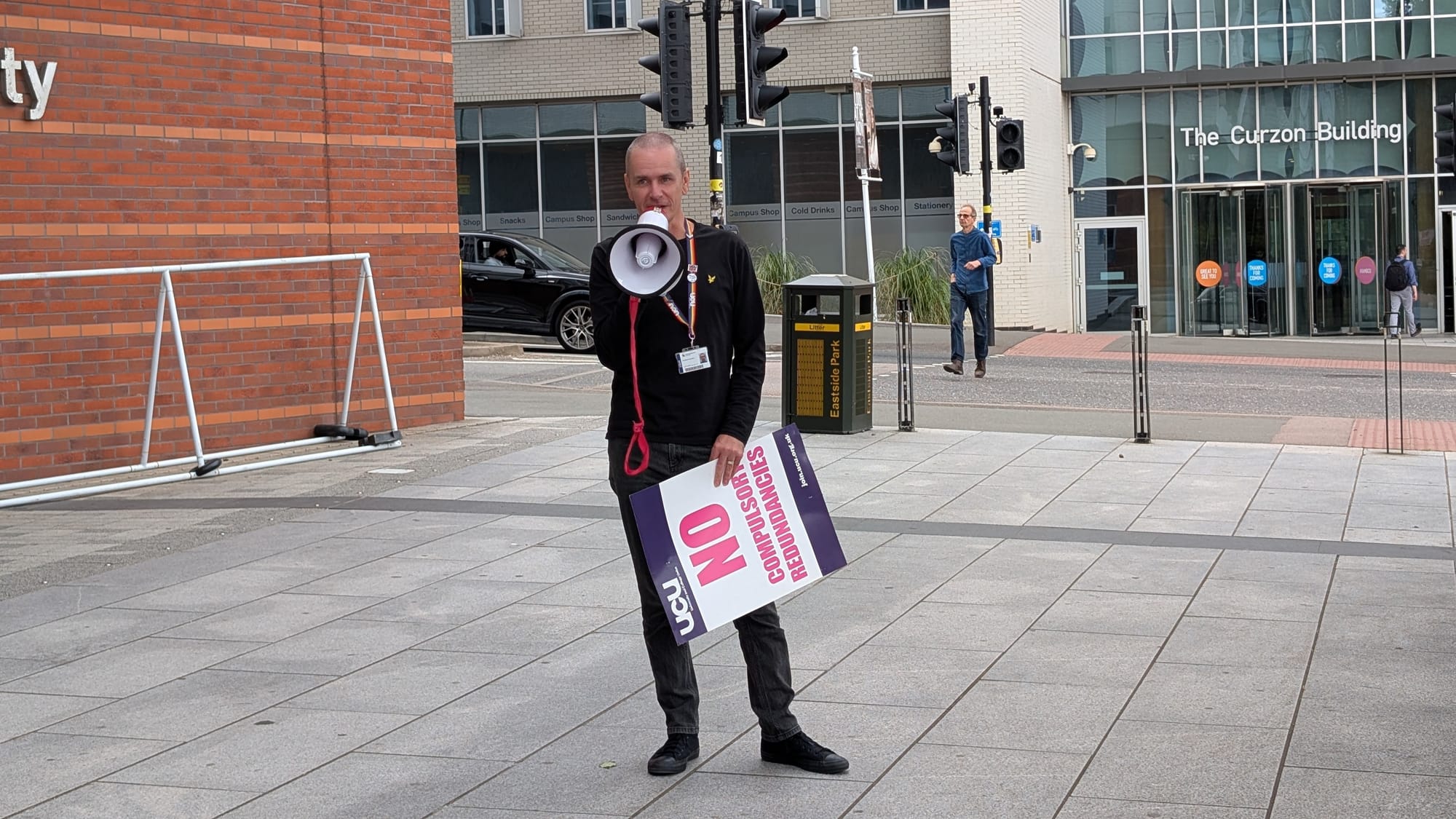
Undeterred, Mba and the BCU board recently announced further changes: 342 redundancies in the professional services department. These include staff who provide academic support, careers guidance and business services; their jobs will be replaced with 320 new roles. The news has not gone down well with UCU members who held a protest at the BCU city centre campus in June.
Librarian Graham Gamblin, whose job is not under threat but who was there to support those whose are, says “there have been redundancies before — there are in any large organisation from time to time.” But he’s concerned that Mba has set a precedent with the academic restructure. “I've not seen anything that's been pushed through in quite the same hostile manner. [Mba’s tone] was ‘these are my plans for the university. If you don’t like them, now’s your chance to leave.’”
What’s more, the signs from outside the university are not good. That same month, the Complete University Guide released its league table for 2026. Far from soaring upwards, BCU has dropped 11 places to position 103. The data used by the analysts is all publicly available and was collected between 2021 and 2024, so much of it pre-dates Mba’s time as vice chancellor. He might not be responsible for the fall, but this is the context in which he is making his big shift. The pressure is building.
“While league tables are one of many measures by which universities are assessed, they do not determine our strategy,” the BCU spokesperson told The Dispatch. “Our priority remains the student experience, the quality of teaching and learning, and enabling our students to progress into graduate-level employment.”
From aerospace to academic administration
In April 2024, six months after he became vice chancellor, David Mba sat down for an interview with the university’s Alumni Podcast. Usually reserved for showcasing the achievements of former students, this episode was an opportunity to get to know the new — and most powerful — face on campus.
In a video of the conversation on YouTube, Mba, wearing a navy blazer and white shirt with the top button undone, his beard neatly trimmed, cuts a professional but relaxed figure. Asked about his early career aspirations, he reveals he always wanted to be an aerospace engineer, to build “spaceships like most young boys want to do.” But things didn’t work out that way. After graduating, he tried “many times” to get into his chosen industry, but kept being turned down. He spent nine months washing cars instead.
It was a PhD in engineering at Cranfield University and an award-winning thesis which led to an academic job offer in 2001. After 13 years, Mba shifted into management. Executive posts at London South Bank, De Mont Fort and University of the Arts London (UAL) followed, before he arrived where he is today.
On the podcast, Mba is asked what advice he would give to himself as a new graduate. Pausing for a moment, brows slightly knitted, he considers his response. “Be bold, be confident and be resilient,” he says, slowly. “Because the best laid plans never work out.”
As it happens, sources say Mba’s first year at BCU went pretty smoothly. It wasn’t until early September 2024 that he began to make waves. “All of a sudden, his tone seemed to change,” says one member of faculty, referring mostly to Mba’s communications by email.
Even so, the changes Mba introduced were relatively small. He made it compulsory for staff to be on campus three days a week, adjusted some academics’ yearly review processes and their administrative workloads.
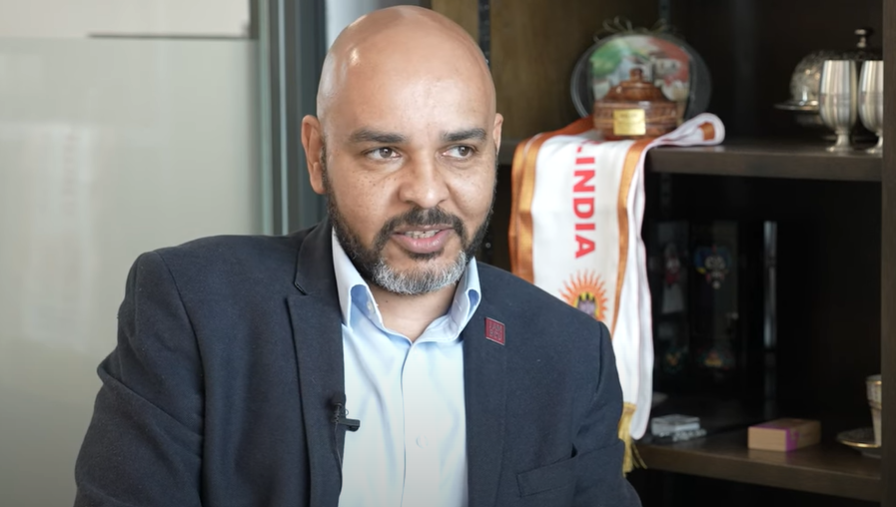
Some faculty didn’t like these changes much and raised concerns via the union but there was no great uproar. Later, however, it became clear that this was just a small sign of what was to come.
‘We say “I am BCU”’
“As Vice-Chancellor Professor David Mba approaches 12 months in post, and BCU moves closer to the November launch of its new strategy, he describes this time as a period of opportunity that should be seized.”
So opened a rousing email that dropped into the inboxes of all BCU staff on 18 September 2024. In it, Mba briefly outlined changes he was going to make that autumn. His top priorities were: a “sharp focus” on the student experience and closing the gap “between [grades for] Black students and those from other ethnic backgrounds”.
He explained that the process by which faculty are assessed — their Individual Performance Review (IPR) — would be updated with clear goals related to these priorities. Essentially, faculty would be formally held responsible for making sure both the student experience and outcomes for disadvantaged students improved.
The “student experience” refers to the overall experience a student has of their course, during their time studying for a degree. This feedback is collected annually from final year students in the independent National Students Survey (NSS). The data, available online, shows that respondents say that teaching quality is improving.
In late 2023, BCU commissioned its own survey, from the analysis firm Alterline. The university wouldn’t provide The Dispatch with this data, but I did sit down with the president of the BCU Students’ Union, Shoukat Mehsud. The 24-year-old law student insists Mba’s changes are coming at the request of the student body, that the feedback from this survey provided the foundation for the new strategy. It included requests for “more teaching, more productive lectures and practical workshops,” he says.
“We say ‘I am BCU’” he tells me, referring to a slogan the university adopted several years ago. “Every student has an expectation when they come to BCU, and they should proudly say ‘I am BCU’. If the university is not providing what they want, what's the reason for BCU?”
As for improving grades for disadvantaged students, Mehsud says this is a “big challenge”. Although he hasn’t heard Mba use the phrase “deficit model”, Shoukat echoes the vice chancellor’s view that lecturers “should help” instead of saying certain students “can’t succeed”.
He is an international student and has high expectations of BCU for himself and his classmates. “Because if I am not good in [my] studies, it's the responsibility of the university to make me, to provide me a platform where I can survive.”
The spokesperson for BCU says “the reference to a ‘deficit model’ has been mischaracterised”. They maintain the university’s position is clear: “all BCU students have the right to be here, to succeed in their studies, and to our full respect. Our commitment is to support student success, recognising the barriers some groups face, and to work with staff to address these fairly.”
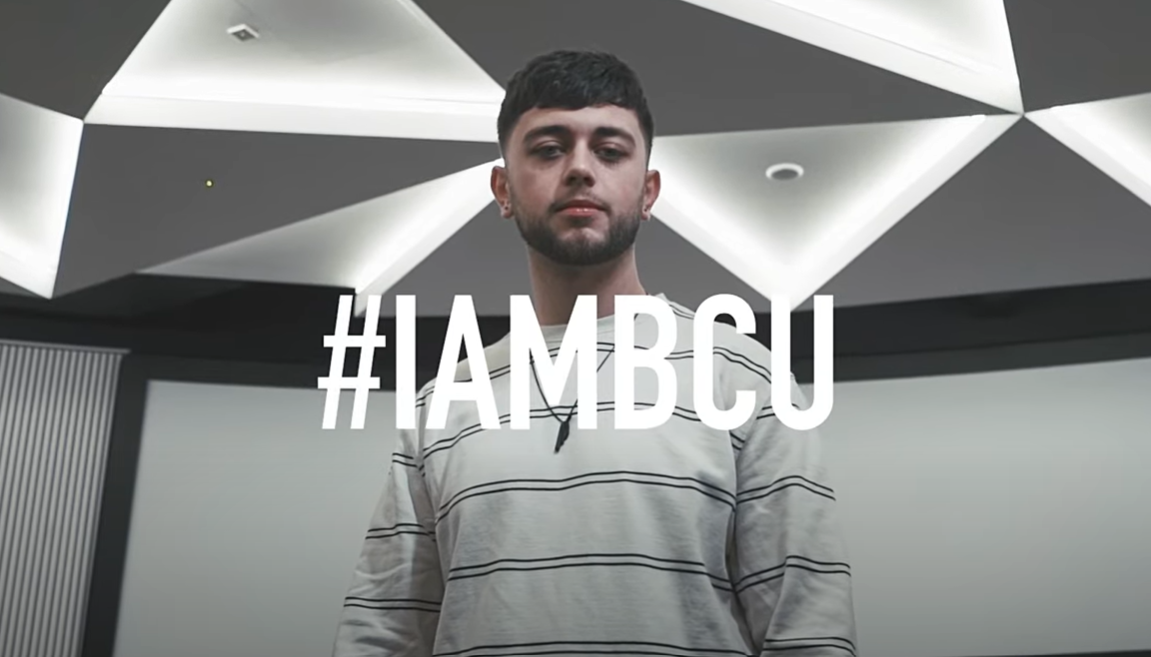
The faculty union, on the other hand, says that the university needs to enable lecturers to achieve these goals.
Peter Crowther is a senior technician at BCU and the secretary for UCU’s regional committee. He says the Vision 2030 strategy is “so broad strokes it’s impossible to be angry at it”. The problem, he adds, is that the university is expecting lecturers to make improvements without investing more in student support. In other words, they’re being told: “we need that line to go up and we’ll leave you to it.”
He recalls, at a town hall in September, a faculty member from the College of Architecture saying to Mba: “We haven’t got enough furniture for the students, let alone the wild ambitions that are being displayed here. We could just do with enough chairs for all of our students.”
‘This position is non-negotiable’
In mid-February, David Mba announced he was pushing forward with the next stage of his strategy: “our focus is on being a teaching-intensive university. This position is non-negotiable,” he wrote in an email to staff.
He also reiterated that it was unacceptable for staff to “adopt a ‘deficit’” approach: “I must be clear, that there is no such thing as the ‘wrong kind of BCU student’, as every individual studying at BCU has the right to be here, and to our utmost respect.”
He gave the employees an ultimatum: “I want to know that everyone who is a part of the BCU team as we enter the next academic year is 100% committed to our ambitions.” Anyone who wasn’t on board, he announced, was welcome to leave. He was launching a ‘Mutually Agreed Resignation’ scheme which almost the entire workforce could apply to. If they were successful, they would receive a goodbye payment.
Mba was no longer interested in trying to win over the staff or in asking them to wait to see the results of his strategy. Either they were with him, or they could go.
The reaction from union members was dismay. “It's not technically a redundancy package, it’s resignation on the provision you agree not to take the university to employment tribunal,” one faculty member who did not want to be named told me. They were amazed that BCU, which unlike many other higher education providers is not in financial trouble, wanted to spend money, as they see it, to encourage departures.
As the weeks went on, BCU’s communications team sent regular emails to staff promoting the MAR scheme via their internal newsletter Tiger Today. They included the high open rate of the emails to suggest the scheme was popular, prompting one employee to ask, according to my source, “when did Tiger Today become the ministry of truth?”
The BCU spokesperson said that among more than 3,000 staff who were eligible to apply, “around 225” applications were accepted. “A very small number were not accepted, for very specific reasons related to business need, such as the risk of negatively impacting the experience of our students.”
A job finder loses his job
Mba’s transformation of BCU hasn’t stopped there. In June, the university announced it was axing 342 roles in professional services and replacing them with 320 jobs that will better align with its new, teaching-focused structure. The following month, the faculty union held a protest on the city centre campus.
Geoff Dexter, a graduate career coach, tells me “they’ve placed me in redundancy at a really critical time.” He is supporting 24 students who are leaving, trying to help them find employment. He was about to take on another cohort of 25 for the next year. He says many of the students he works with are from underprivileged demographics.
Of the Vision 2030 proposals, he says he agrees “with the idea of making sure that there is all the support that's needed for students and people locally in the community, very much”. These redundancies are “counterproductive,” he adds, “they've actually damaged their strategy, because some of the work that we do is instrumental to that.”
As the demonstration continues and speakers take to the megaphone, a couple students stop to observe, looking unimpressed. They are a young man and woman, both British South Asian undergraduates in the School of Business. The woman tells me some of her lecturers don’t put enough effort into explaining topics, instead relying on “teaching from slides”. She agrees with both the students union and Mba that improvements need to be made.
Welcome to The Dispatch. We’re Birmingham's new newspaper, delivered entirely by email. Sign up to our mailing list and get two totally free editions of The Dispatch every week: a Monday briefing, full of everything you need to know about that’s going on in the city; and an in-depth weekend piece like the one you're currently reading.
No ads, no gimmicks: just click the button below and get our unique brand of local journalism straight to your inbox.
The BCU spokesperson told The Dispatch: “our focus is to provide fee-paying students with the best possible university experience, taking very important steps to continually improve teaching standards and the educational outcomes of our graduates.”
And yet, not all students are behind Mba. Oliver Phillips is a white, 21-year-old recent graduate who paid an “ungodly amount” for his education. He sympathises with lecturers who, in his experience, were good at teaching students with a variety of needs. “If the vice chancellor wants an increase in grades, then an increase in care for lecturers is needed,” he tells me.
“You know, that's directly proportional. You look after your staff to look after your students and your students to look after their grades.”


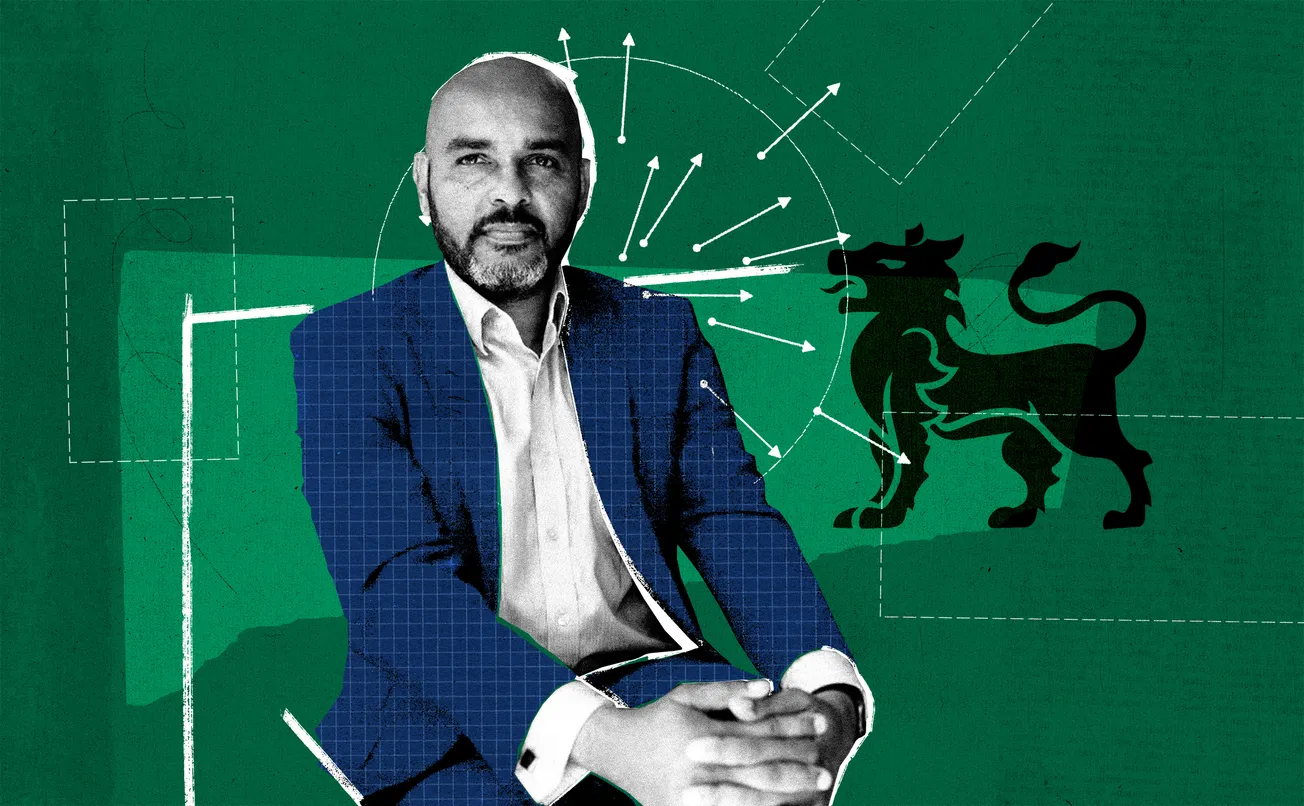


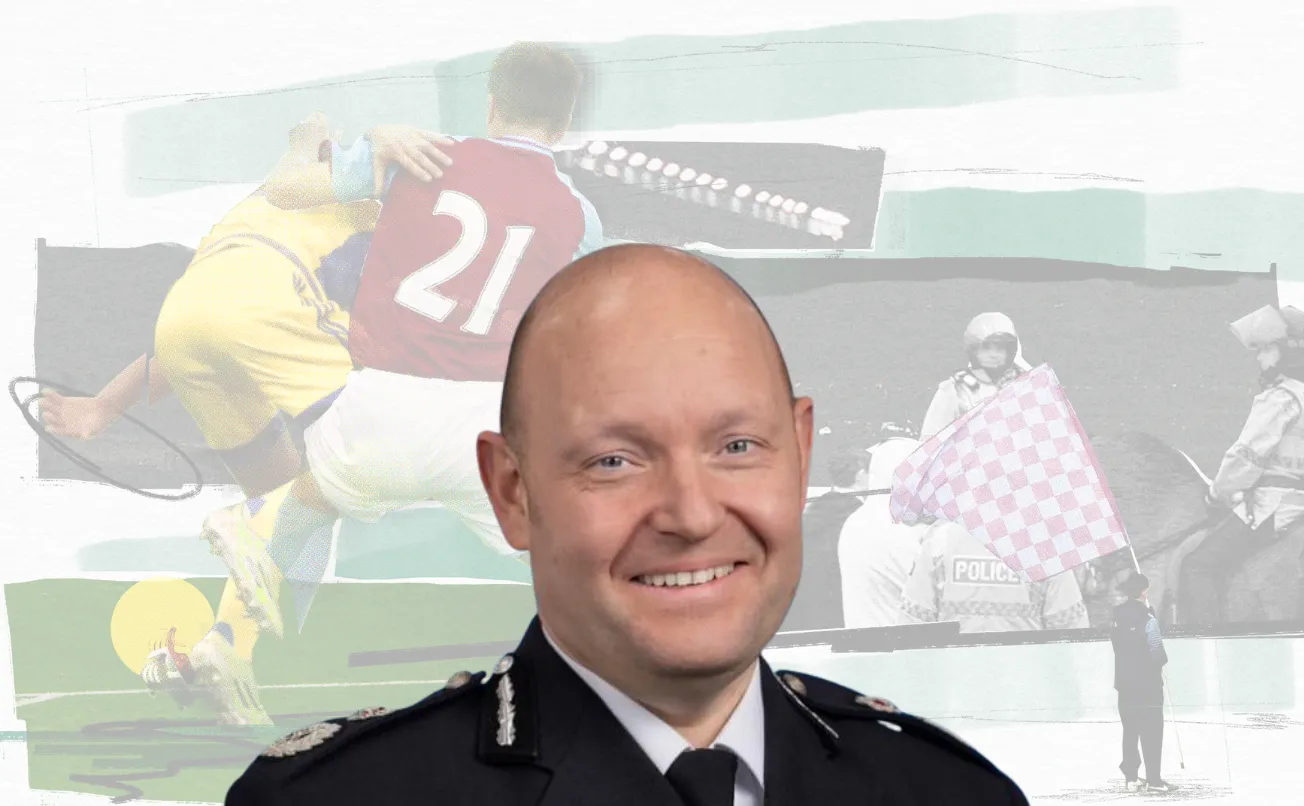


Comments